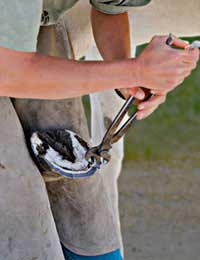How to Care for a Racehorse

The issue of how to care for a racehorse is a multi-faceted one and one which comprises several different strands. There are many people involved with the care of a racehorse, from the trainer to the groom and all the way down to the stablehands. Most people think about the care of a racehorse and think only about the trainer – that person who gets the horse ready for its races, in much the same way a sportsman or woman has a trainer or a coach to prepare them for matches and competitions. But a racehorse needs much more care than that and needs people to look after every aspect of its life – from its feed to its medicine to its daily care. Horses are living, breathing creatures as well as investments and therefore, every aspect of their welfare must be looked after.
The Trainer
The trainer is the most visible member of the caring team, the person most often seen by the fans, and even the owner, depending on how big a part they play in the caring of the horse. People will see the trainer with the horse in the paddock and see the work they put in with the horse. And it is the trainer and the jockey who are named in the race guide. The trainer’s role is vital and top trainers are hard to come by. Training a horse is a way of life rather than a job. The trainer works in much the same way as a human’s sport coach. They are at the top of a pyramid of people working with the horse and all problems must be reported to them so they can modify the training schedule accordingly. The trainer organises runs and races and timed exercises for the horse, also working with the jockey so that they know the best way to get the most out of the horse.
The Groom
In terms of day-to-day care of the horse, the groom is the key member of the team. And grooming comprises a lot more than just making sure that the horse looks good – although this is an important part of the groom’s job, especially on a race day. The groom is responsible for keeping the stable clean and mucking out, and for looking after tack and getting the horse ready everyday. Because they spend so much time with the horse, the groom usually has the strongest bond with the animal and is the first to become aware when something is wrong and when a vet is needed. The groom knows the horse and how the horse thinks and feels – knowledge which is invaluable to the whole team which looks after the horse. Grooms will usually be highly qualified, with at least an NVQ in equine care, but often with many more horse-related qualifications.
The Stablehands
The stablehands are also an integral part of the team. They work under the groom and carry out more menial tasks – but all vitally important in the care of the horses in their stable. They are often aspiring grooms and almost without exception, do the job because of the love of the horses. They are low-paid and hard-working but because of the time they spend in the stables, they too become very close to the horses in their care and often spend time soothing and reassuring horses, in much the same way that a teaching assistant in as primary school classroom would with children.
Of course, there are dozens more people involved in the care of a racehorse, including the farrier, the vet and many more. But these are they key players and their key tasks. The overriding concern in the stable of any racehorse is that the horse is healthy and happy. If they are neither healthy nor happy, then they will not perform well. So for this reason, and those reasons of humanity, the horse’s welfare is always paramount.
- Definitions: Stallions, Geldings and Mares
- Is Racing Horses Humane?
- How to Care for a Horse
- Veterinary Care
- Stable Management
- Preventing Illness in Horses
- Shelter for Your Horse
- Good Hoof Care
- Caring for Your Horse: Time
- Mucking Out
- TLC: What Every Horse Needs
- A Healthy Diet for Your Horse
- Grooming Your Horse


Re: Body Protectors and Back Support
When wearing my back protector, my lower back actually hurts more. What should I do?
Re: How Riders Use Stirrups
Thank you for article. Could you elaborate more on why we use stirrups. Every search of "why we use stirrups" only gave a few sentence…
Re: Mucking Out
How old do you have to be able to do stable hand ?
Re: Showjumping: Where to Start
To compete at high levels in showjumping is it easier to have your own horse, share or loan? Thanks
Re: What Equipment Will You Need?
i have just starting riding only had one lesson already got the boots jodphurshat polo and whip im really serious about this
Re: What to Wear as a Beginner
I am a beginner and I was wondering what are the best joppers , gloves .etc. that I could buy could you help me.
Re: What Equipment Will You Need?
I found this very good because my daughter is at cantering stage and we were thinking about getting her a horse although did not…
Re: Riding Hats
I don't jump yet but I do a lot of canter work in my lessons. Do I need a body protector or not?
Re: What Equipment Will You Need?
I never had to use a helmet, crop, or proper clothing while training my horses. When I first got my Arabian cross she was crazy,…
Re: Horse Boxes and Trailers
@Darren - there are places that give horsebox driver training, so that you can drive with confidence, as it can be a stressful…